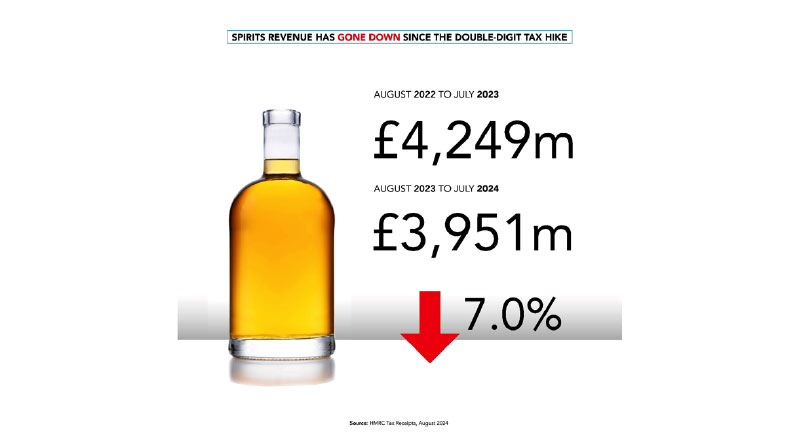Treasury Loses £298 Million In A Year From Spirit Tax Hike

New figures from HM Revenue and Customs have shown the Treasury has lost nearly £300 million in tax revenue from Scotch Whisky and other spirits since Jeremy Hunt’s record-breaking tax hike last August.
Figures for 1 August 2023 to 31 July 2024 show excise duty from spirits generated £3.951 billion for the public finances – compared to £4.249 billion in the same period the previous year – a loss of £298 million or £800,000 a day.
Jeremy Hunt increased excise duty by 10.1 percent from 1 August 2023 – the biggest such tax hike in more than four decades. The UK has the highest level of excise duty on Scotch of the G7 countries and the fourth highest in Europe – double that of France and quadruple the excise duty of the United States.
The Scotch Whisky Association has urged Rachel Reeves to reverse the economic damage caused by her predecessor in the Budget on 30 October. Nearly 70 percent of the cost of a bottle of Scotch in the UK is currently claimed in tax.
Scotch Whisky generated £7.1 billion a year for the economy and is the UK’s number one food and drink export.
The Office for National Statistics concluded that Jeremy Hunt’s duty increase resulted in the largest contribution to inflation by alcohol on record. Analysis on behalf of the Scotch Whisky Association has found that the tax rise made a 0.35 percent contribution to inflation – resulting in £2.3 billion in extra government interest payments on public borrowing.
Mark Kent, Chief Executive of the Scotch Whisky Association said:
“The Treasury has now lost more than a quarter of a billion pounds because of the previous Chancellor’s decision to increase tax on Scotch Whisky and other spirits. It has been a calamitous decision, which has cost the Treasury money that could have been used for public services. It has stoked inflation, and it has hurt business, hospitality and households.
“We urge the Chancellor to use the Budget to reverse the economic damage caused by her predecessor and deliver on the Prime Minister’s commitment to back Scotch Whisky distillers to the hilt, and in turn boost growth in Scotland.”
